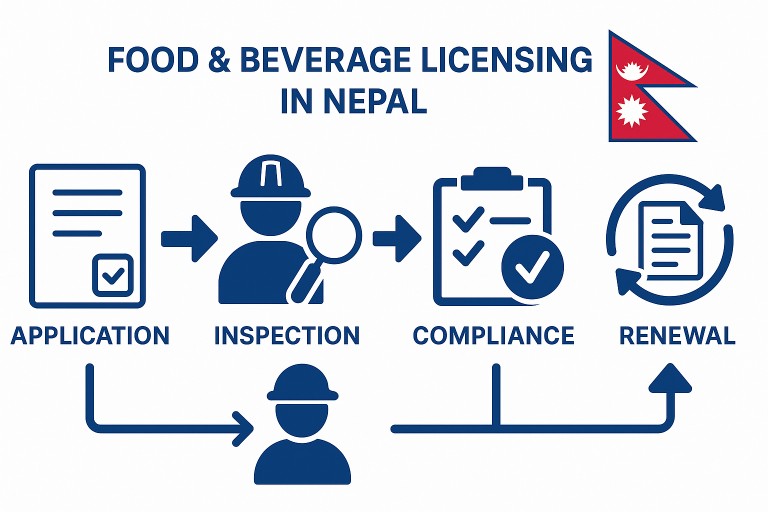DFTQC in Nepal: Practical Guide for Food Businesses

What DFTQC Is (and Where It Sits)
The Department of Food Technology & Quality Control (DFTQC) is one of three departments under Nepal’s Ministry of Agriculture & Livestock Development. It was established in 1961, with its central office located in Babarmahal, Kathmandu.
Legal Backbone
Nepal’s Food Hygiene and Quality Act, 2081 (Act No. 1 of 2024) replaced the older Food Act of 1966. This Act, effective from May 5, 2024, is the primary law governing food safety and quality, implemented by DFTQC.
Formal Roles of DFTQC
Standards, Inspections & Enforcement: Market checks, facility inspections, sample collection, and legal action.
Laboratory Testing: Through a nationwide lab network and an official Laboratory Information Management System (LIMS).
Trade Interface: Functions as Nepal’s National Codex Contact Point and WTO-SPS Enquiry Point for international food trade and safety coordination.
Licensing & NeFFILS
DFTQC now provides digital licensing through the Nepal Food & Feed Industry Licensing System (NeFFILS). Businesses can apply online for new licenses and renewals.
How to Apply
Create a NeFFILS account and select New License or Renewal.
Provide company and facility details, product scope, and processes.
Upload required documents (business registration, PAN/VAT, layout plan, GMP/GHP/SSOP, HACCP if applicable, water test report, QC personnel, equipment list, draft labels, waste management & recall plan).
Pay fees, undergo inspection if scheduled, and track status online.
Mandatory Standards & Key Directives
Quality Standards (2080): DFTQC publishes binding standards for food and feed products.
Industrial Trans-Fat Rule (2024): Legal cap introduced on industrial trans-fatty acids (effective February 2024). All edible oils and processed foods must comply.
Dietary Supplements: DFTQC issues periodic guidelines and maintains a register of approved products.
Importing Food Into Nepal
DFTQC regulates food/feed imports through:
Document checks at customs.
Sampling and testing (if required).
Compliance with Nepal’s labeling and quality standards.
Inspections & Market Surveillance
Routine and targeted inspections of businesses.
Mobile food lab vans for on-site testing, especially during festival seasons and in high-demand areas like the Kathmandu Valley.
DFTQC Presence Across Nepal
Besides its Kathmandu HQ, DFTQC operates provincial field offices and laboratories to support licensing, inspection, and testing.
Quick Checklists
For Manufacturers/Processors (spices, bakery, oil, dairy, etc.)
Company registration + PAN/VAT.
Hygienic premises (drainage, pest control, potable water, waste disposal).
GMP/GHP/SSOP systems; HACCP for higher-risk categories.
Apply via NeFFILS → inspection → license → renewals.
Technical file: product specs, stability data, CoAs, batch records, complaint & recall logs, labels as per standards.
For Importers/Distributors
Verify foreign compliance & obtain product documentation.
Prepare Nepal-compliant labels.
Follow DFTQC’s import clearance procedures.
Maintain traceability and be ready for recalls/advisories.
For Restaurants/Cloud Kitchens
Hygienic layout, safe water supply, pest control.
Staff health & hygiene training.
Compliance with inspections and municipal advisories.
Contact & Portals
DFTQC HQ (Babarmahal, Kathmandu) – Contact numbers and email listed on the official site.
NeFFILS – For online licensing and renewals.
SPS Enquiry Point – For trade-related queries and food safety documentation.